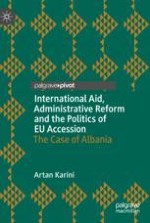2019 | OriginalPaper | Chapter
6. Conclusive Remarks
Author : Artan Karini
Published in: International Aid, Administrative Reform and the Politics of EU Accession
Publisher: Springer International Publishing
Activate our intelligent search to find suitable subject content or patents.
Select sections of text to find matching patents with Artificial Intelligence. powered by
Select sections of text to find additional relevant content using AI-assisted search. powered by
